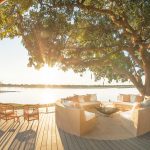Into the Wilderness
Unfiltered Encounters in North Luangwa
Throughout recent years, travel has become a large part of my work. As a practitioner in HR and organisational development, I had covertly hoped that my work would someday allow me to leave the familiarity of urban living to make a meaningful difference in far-flung regions I had only learned about in my high school geography classes.


As destiny would have it, my career growth played into this innate passion for adventure. Consequently, I have ventured to some of Zambia’s most interesting and exciting corners seizing every opportunity to immerse myself in the unparalleled splendor and distinctiveness of the diverse landscapes that define the Real Africa we call home.
Regardless of my whereabouts, the wild has always beckoned and I have consistently answered its call.
One of these work escapades that has profoundly instilled within me a lasting sense of gratitude has been a visit to North Luangwa National Park, where conservation tourism is embodied by the teams that empower communities to live off the land sustainably and preserve the Luangwa ecosystems for future generations. I have come to subscribe to this form of eco-tourism because it has compelled me to execute my duties in a manner that minimises ecological impact while affording me first-hand encounters with the wonders of nature and the invaluable opportunity to uplift the very communities I serve.
Nestled gracefully along the banks of the majestic Luangwa River, within Zambia’s Muchinga Province, lies the captivating North Luangwa National Park—an exquisite gem adorning the northern fringes of the renowned Luangwa Valley. This pristine wildlife sanctuary is part of the southern tip of the Great Rift Valley. It is one of Zambia’s last untamed wilderness habitats, with unparalleled access to unfiltered experiences rarely encountered elsewhere on the continent.


The national park is usually only accessible to valiant rangers from the Department of National Parks and Wildlife (DNPW), volunteers and employees of non-profits who have dedicated their resources and lives to sustainable landscape conservation. This restricted accessibility is in contrast with its southern counterpart, one of the most popular tourist attractions in Zambia. Therefore, you can well fathom the immense privilege I felt to travel and contribute to the North Luangwa area and support the teams doing essential work for the future of the Luangwa ecosystem.
Embarking upon the voyage to reach the revered North Luangwa National Park was a feat in and of itself. It took ten hours to drive from Lusaka to Mpika, the closest town to the North Luangwa National Park, which is a base for many visitors seeking to rest and recoup before going into the untamed wilderness.
From Mpika, our expedition continued for a little over two hours, leading us to the very doorstep of the park’s base office. The journey initially provided marvellous scenery of the Muchinga Escarpment, with rolling hills, verdant valleys and sentinel-like inselbergs similar to those of the Mutinondo wilderness. The views then morphed into plains with dotted settlements and it eventually gave way to a series of hills with beautiful vantage points overlooking the endless expanse of mopane and acacia woodlands that make up the North Luangwa National Park.
When we finally arrived at the campsite, sheer delight engulfed me when I discovered my secluded haven nestled alongside a tributary of the Luangwa River. After settling down, I interacted with teams from the DNPW as well as dedicated individuals of the Frankfurt Zoological Society’s North Luangwa Conservation Project. They explained their profound mission to protect species of fauna and flora while promoting sustainable development in communities that live in the Game Management Areas (GMAs) surrounding the national park. I learned that they periodically set out into these growing communities and collaboratively engage, educate and support them to use sustainable farming methods.

The communities have also been taught to utilise alternative livelihood approaches and are now supporting road and infrastructure development within their districts. I witnessed how communities are trained to use alternative energy sources and reforestation techniques to restore the wilderness habitat stretching across the GMAs and the national park. I had the honour of acquainting myself with the dedicated teams monitoring diverse plant and animal populations working to curb human-wildlife conflict.
Facilitating sessions centred around leadership, engagement and cohesion across these teams was intrinsically fulfilling as I realised our work’s impact in enabling them to progressively make their initiatives a reality and ultimately support the ecosystem’s future sustainability. After my sessions were completed, I came to acknowledge that in our unique way, we should all play a role in supporting the efforts of front liners in the conservation space by taking an interest and raising awareness of the work being done. Together, we can forge a path towards safeguarding these natural wonders and preserving their irreplaceable splendour for future generations.
In my time there I learned that the North Luangwa ecosystem boasts rising populations of elephants, buffalos, lions, rhinos and leopards, Africa’s Big 5. The remarkable resurgence of these iconic species owes its gratitude to the conservation work done by these teams, especially in the case of the black rhino and elephant species. One particular moment remains etched in my memory—an experience akin to an enchanting David Attenborough documentary—as I was granted the privilege to witness the nurturing of a few black rhinos.
It was amazing to realise how rare it was to see these endangered animals in their natural habitat, let alone see how playful but aggressively territorial they can be. The rhinos have been allowed to roam freely within the park. They are consistently observed by monitoring units, similar to what is done in Livingstone’s Mosi-oa-Tunya National Park.
As twilight descended upon the park, a captivating spectacle unfolded before my eyes.
Antelopes, zebras, warthogs and elephants would gracefully gather along the riverbanks, partaking in their evening sojourns as they indulged in nature’s sundowners. Little did I anticipate the gentle giants would cross the river under the dim moonlit sky and decide to savour the large succulent sausage tree pods within the campsite or seek to scratch an itch against the side of my tent. Dear reader, nothing can prepare you for the sheer presence, the grunts and the sound of flapping ears as an elephant leisurely makes its way around your humble abode in search of food, with nothing but a thin layer of polyester serving as your shield.
It’s worth noting, the North Luangwa National Park is also an oasis for birding enthusiasts, and you are sure to see several species around the woodland expanse.

Thankfully, as the week unfolded, I gradually acclimated to these enchanting encounters. Yet, on one unforgettable evening in the camp, I found myself immersed in a chorus of distant whoops and laughter emanating from hyenas. Suddenly, the deep resonating roar of a lion pierced the night and sent ripples in the air, ultimately leaving only crickets brave enough to serenade in the darkness.
I appreciated ending each day with the serene sight of a clear star-studded night as I took deep breaths of the crisp, clean air. Overall, my experience in Zambia’s ultimate wilderness continues to impact my ongoing adventures positively.
As you embark on your work-related travels or venture forth in search of Zambia’s myriad adventures, I encourage you to embrace the ethos of eco-tourism wholeheartedly by spending your resources at facilities that have proven to participate in conservation efforts while also promoting responsible practices that link the livelihoods of communities to the landscape. A few camps are being set up within the North Luangwa region this year, so if you want to go and experience the wilderness and support eco-tourism, you will be able to do so by this time next year.



